Introduction
In the competitive landscape of legal marketing, understanding the distinct roles of social media and search engine advertising is crucial for attorneys aiming to connect with potential clients. Each platform offers unique advantages—social media fosters brand engagement and community building, while search engine advertising targets users actively seeking legal services.
As legal professionals navigate these strategies, they must consider:
- Best practices
- Budget implications
- The importance of precise audience targeting
By leveraging analytics and performance metrics, attorneys can refine their marketing efforts, ensuring they engage effectively with their audience and drive meaningful results. This article delves into the intricacies of both advertising methods, providing insights to enhance legal marketing strategies in an ever-evolving digital landscape.
Understanding the Distinct Roles of Social Media and Search Engine Advertising
In the field of legal promotion, social media outreach and search engine promotion serve distinct and supportive functions for online advertising for attorneys. Social networking platforms, such as Facebook and Instagram, are primarily utilized for brand engagement and relationship building with potential clients. These platforms enable attorneys to highlight their expertise, share client testimonials, and foster a community around their practice, enhancing visibility and trust.
In fact, 37% of law firms are currently investing in LinkedIn promotion, reflecting a trend towards utilizing social media for professional networking and client engagement. Conversely, online advertising for attorneys, especially through Google Ads, is designed to capture intent-driven traffic. This approach strategically targets users actively seeking services, allowing attorneys to utilize online advertising for attorneys to present their offerings precisely when potential clients are in need.
Notably, a concerning statistic reveals that 27% of law firms did not answer return phone calls (Clio, 2020), underscoring the importance of responsiveness in legal marketing strategies. Furthermore, website optimization has been identified as a primary online marketing strategy for law firms, which is essential for effective online advertising for attorneys to enhance online visibility and user experience. A comprehensive understanding of these roles is essential for attorneys to determine which promotional strategy best aligns with their business objectives and audience demographics, ultimately driving more effective marketing outcomes.
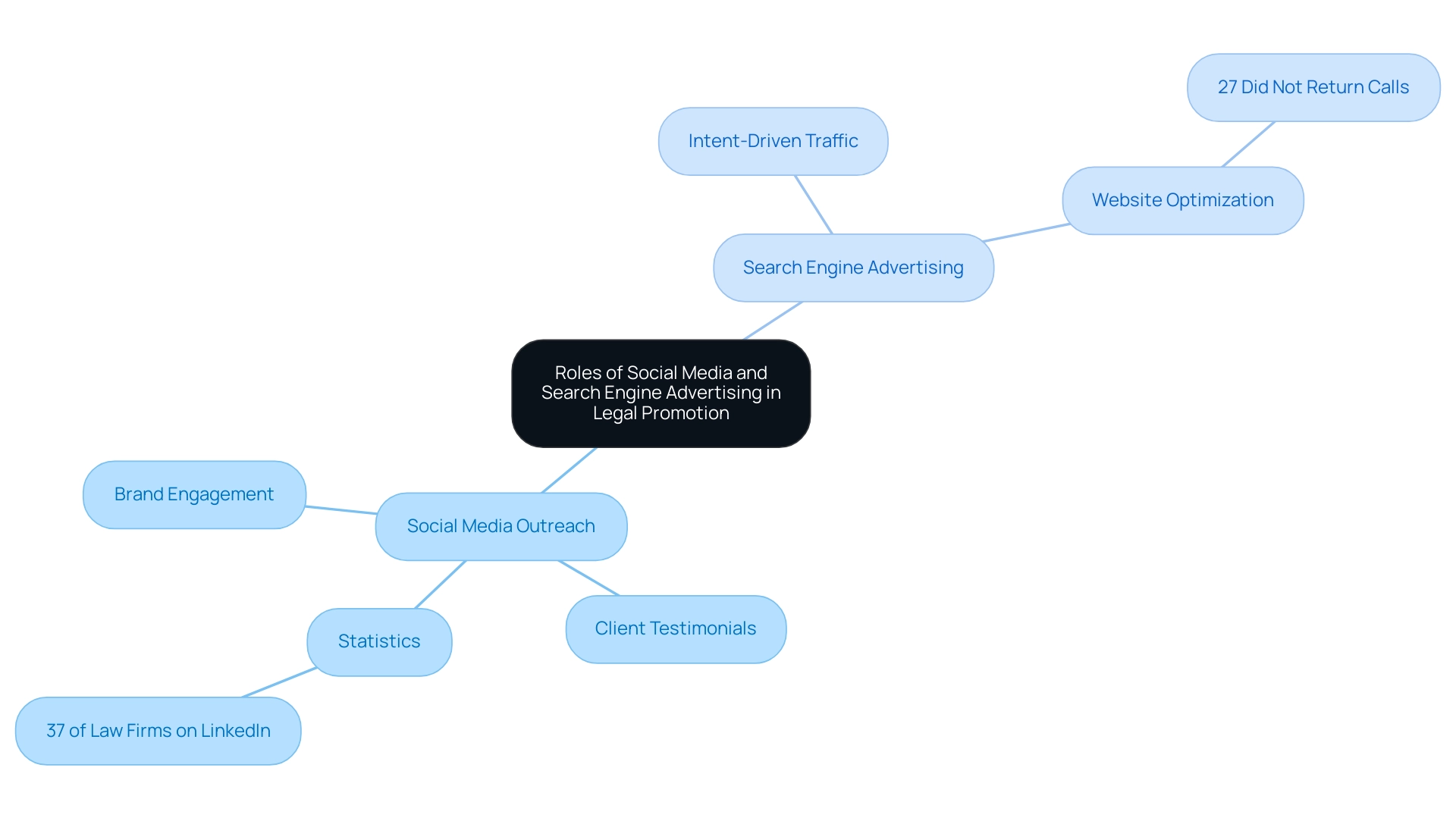
Maximizing Impact: Best Practices for Social Media and Search Engine Advertising
To effectively harness the power of online advertising for attorneys, they must prioritize the creation of compelling content that resonates with their target audience. Engaging formats such as:
- Video testimonials
- Informative posts
- Interactive elements like polls or Q&As
are particularly effective in capturing attention. Notably, when exposed to brand messages on LinkedIn, people are six times more likely to convert, highlighting the platform’s potential for driving client engagement.
Consistency in posting schedules and a commitment to promptly addressing client inquiries are essential practices that significantly enhance audience engagement. In the realm of search engine promotion, conducting thorough keyword research is crucial. Attorneys should focus on identifying and bidding on keywords that are important for online advertising for attorneys, which prospective clients are likely to employ when seeking legal services.
Crafting persuasive ad copy complemented by strategically designed landing pages is crucial for online advertising for attorneys, as it can lead to improved click-through rates and higher conversion rates. Furthermore, both promotional strategies are greatly enhanced through the use of analytics. Monitoring performance metrics enables continuous optimization and refinement of tactics, ensuring that attorneys can adapt their approaches to maximize results effectively.
As reported, 84% of brands and marketers have noted positive outcomes from their PPC promotional campaigns, illustrating the potential success these strategies can yield. Additionally, it is worth noting that only 3% of brands regularly publish blog posts longer than 2,000 words, emphasizing the importance of high-quality content creation in digital marketing.
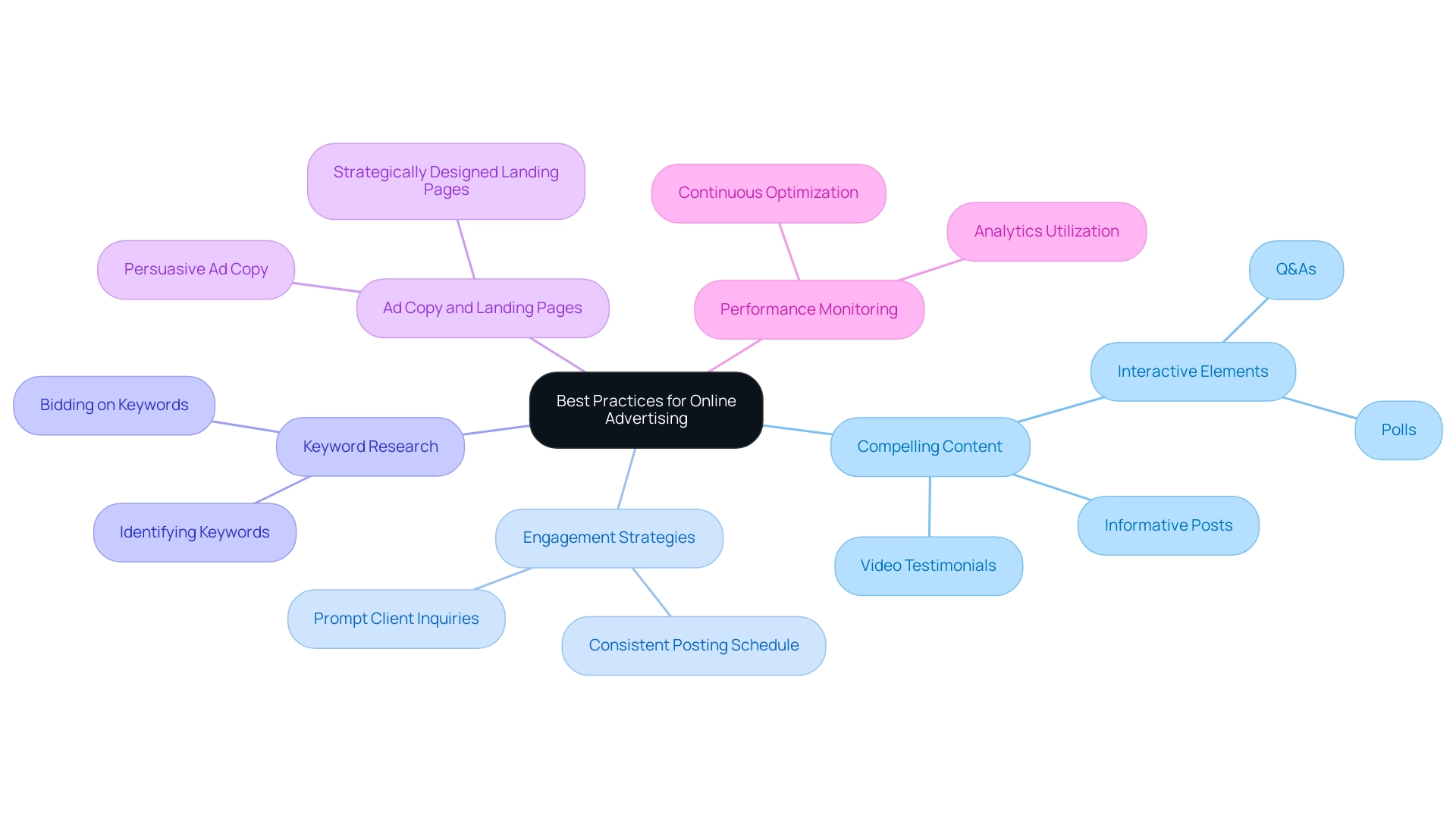
Cost Considerations: Evaluating the Budget for Each Strategy
When evaluating the costs related to social platforms and online advertising for attorneys, professionals in law must consider both direct and indirect expenses. Social media platforms generally utilize a pay-per-click (PPC) or cost-per-impression (CPM) model, with prices varying significantly based on audience targeting and market competition. In contrast, the costs per click are often higher for online advertising for attorneys, especially when targeting competitive legal keywords.
Significantly, 50% of individuals who search locally for services such as lawyers on their mobile visit an office within 24 hours, highlighting the effectiveness of online advertising for attorneys. As noted, ‘50% of individuals who look locally for businesses like lawyers on their mobile visit an office within 24 hours,’ underscoring the potential impact of this advertising strategy. Despite the higher costs, online advertising for attorneys has the potential to attract high-intent leads—who often convert to clients—making this investment worthwhile.
Moreover, attorneys should take into account the time and resources needed to create high-quality material for social media platforms, which frequently demands a more strategic approach than the relatively simple ad creation process for search engines. To maximize their marketing efforts, attorneys should consider partnering with an expert law firm SEO company, which can help attract high-quality leads. An effective marketing budget should encompass both strategies, allowing flexibility to adjust allocations based on performance metrics.
This balanced approach not only enhances visibility but also aligns marketing efforts with the evolving landscape of client engagement.
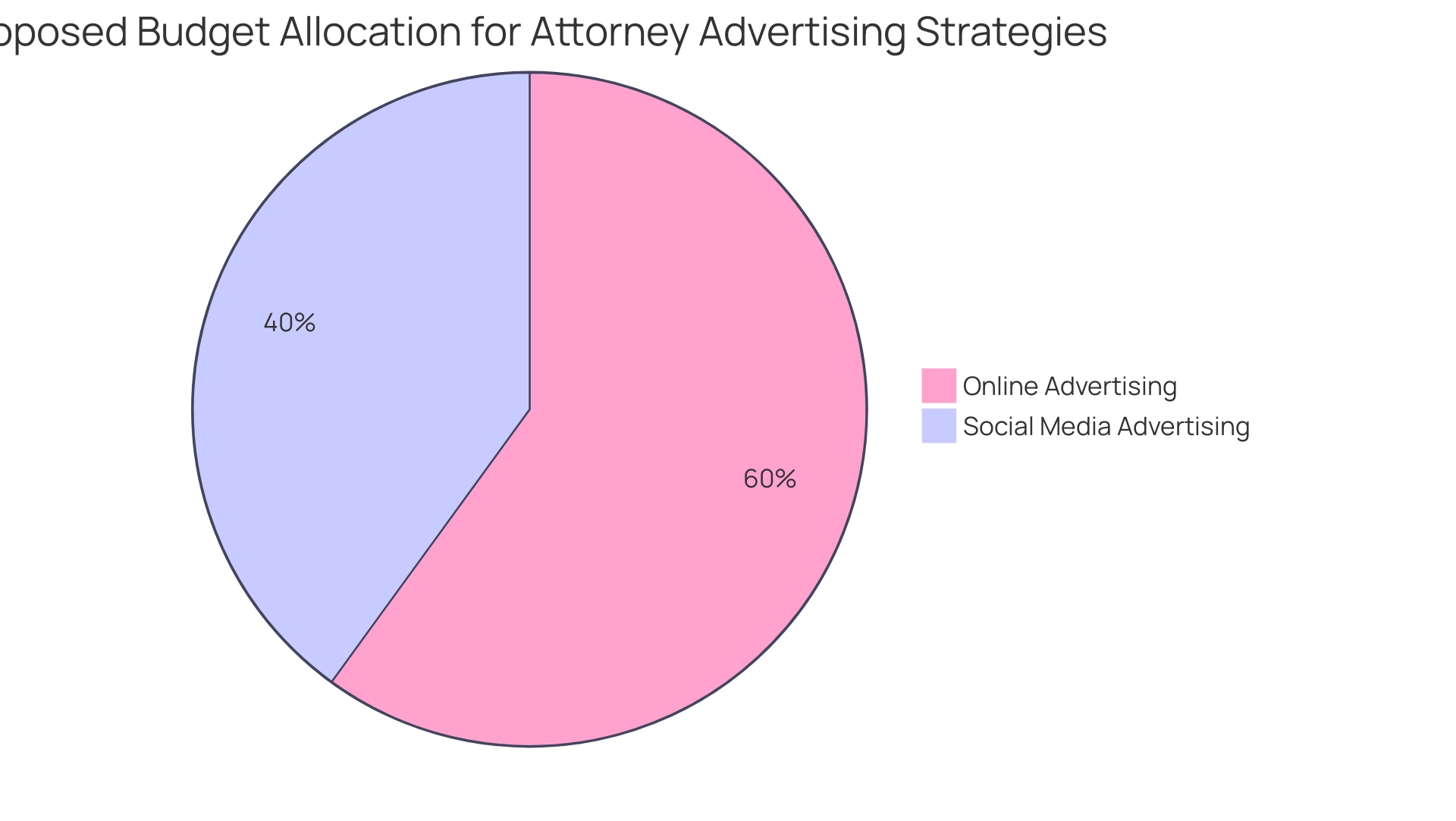
Target Audience: Identifying and Reaching Potential Clients
By utilizing demographic targeting, lawyers can greatly improve their social media promotional strategies in online advertising for attorneys, enabling accurate audience segmentation based on elements like age, location, interests, and behaviors. This approach facilitates the creation of tailored content that resonates with the specific needs of potential clients. With Facebook dominating the social networking scene—featuring 3.03 billion active monthly users, including a significant number of adults—it acts as an essential platform for targeting services effectively.
Moreover, US adults spend an average of 34.1 minutes daily on social media platforms, indicating high user engagement that attorneys can capitalize on. Simultaneously, online advertising for attorneys employs keyword intent targeting, allowing them to connect with individuals actively seeking assistance. By understanding the distinct nuances between these strategies, professionals can enhance their online advertising for attorneys, connecting with potential clients at pivotal moments in their decision-making journeys.
Furthermore, with 41% of Americans with a household income exceeding $100K utilizing Pinterest, acknowledging various demographic segments becomes essential for effective marketing strategies. The integration of analytics tools empowers attorneys to continuously evaluate and adjust their targeting strategies, ultimately enhancing engagement and conversion rates. Insights from recent industry discussions, such as those shared at the Cannes Lions Festival 2024—where experts emphasized the importance of adaptive strategies—underscore the evolving landscape of legal marketing and the necessity of reaching desired audiences effectively.
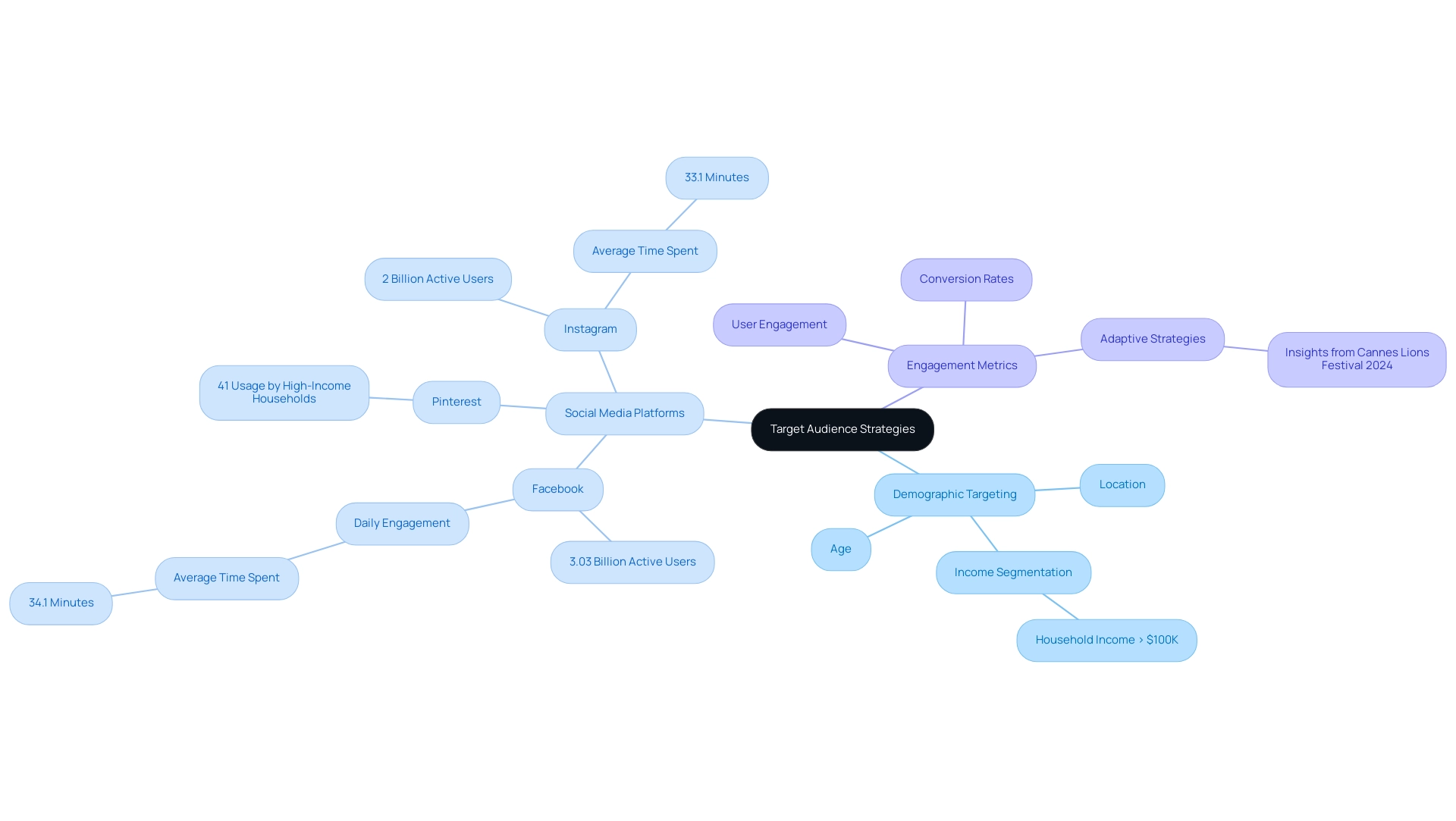
Measuring Success: Key Performance Indicators for Both Strategies
To effectively assess the success of social media promotion, law firms should prioritize engagement metrics such as likes, shares, comments, and overall reach. These indicators provide valuable insights into how well content resonates with the target audience and contribute to website traffic and brand visibility. Simultaneously, essential performance metrics for online advertising for attorneys include click-through rates (CTR), conversion rates, and cost per acquisition (CPA).
For instance, the Kenneth J. Allen Law Group experienced a notable 32% improvement in their conversion rate, highlighting the effectiveness of strategically analyzing these metrics. According to ThinkWithGoogle, > 50% of people who search locally for businesses like lawyers on their mobile visit an office within 24 hours <, emphasizing the critical nature of optimizing search engine strategies. Furthermore, understanding customer acquisition cost (CAC) is essential for evaluating the overall efficiency of advertising efforts.
The case study titled ‘Social Media Engagement: Building a Legal Brand That Resonates‘ illustrates how law firms can connect with potential clients through social media by creating shareable content, using visual elements, and engaging directly with the audience. By continuously analyzing these performance indicators and ensuring compliance with data privacy regulations, attorneys can identify which tactics in their online advertising for attorneys yield the most favorable outcomes and refine their campaigns accordingly. Regular performance reviews facilitate timely optimizations, ensuring that marketing initiatives remain effective and aligned with overarching business goals.
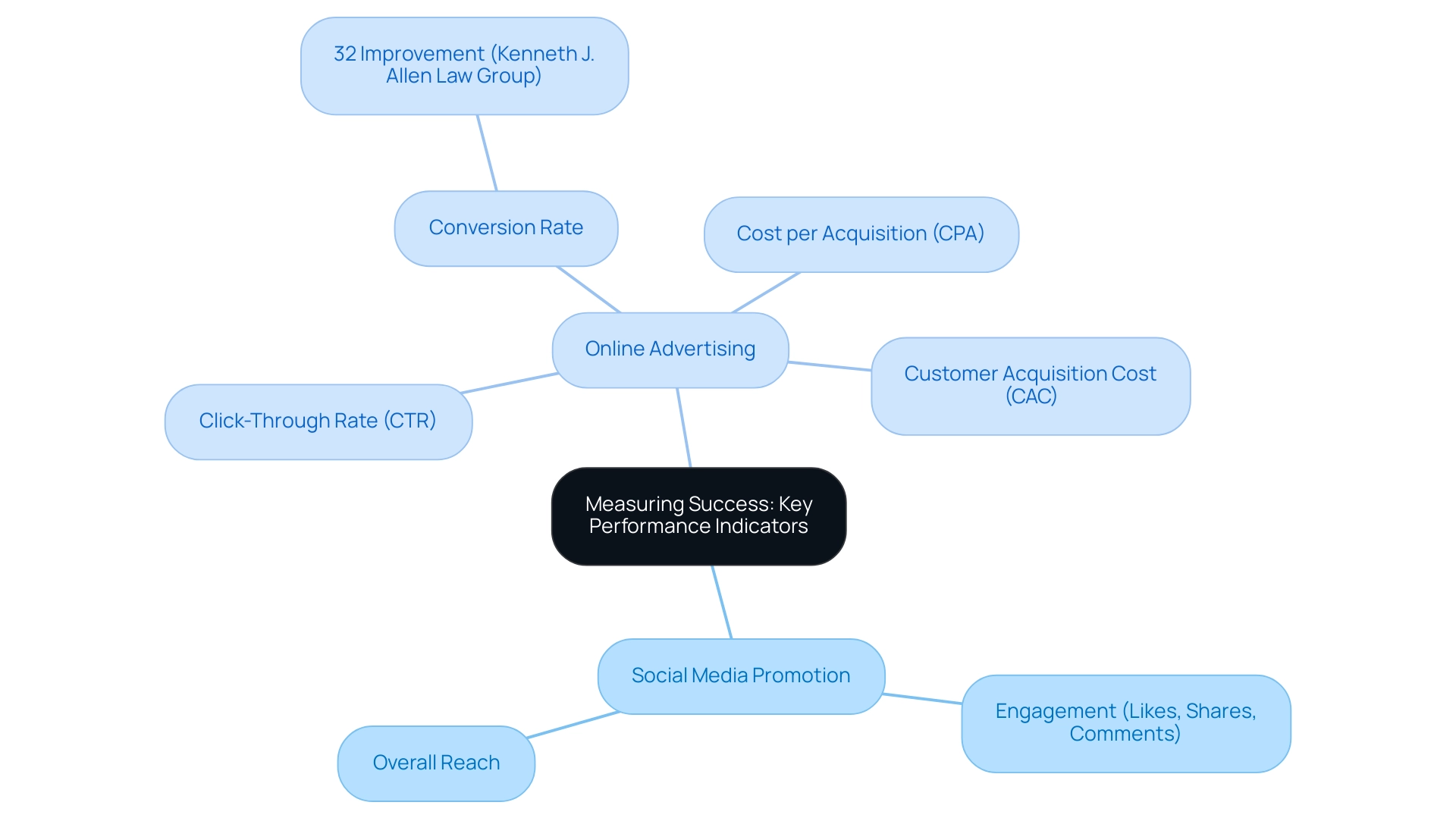
Conclusion
Understanding the distinct roles of social media and search engine advertising is essential for attorneys seeking to improve their marketing strategies. Social media serves as a powerful tool for brand engagement and community building, while search engine advertising effectively targets users who are actively searching for legal services. Each platform offers unique advantages that, when leveraged correctly, can lead to increased visibility and client conversion.
Implementing best practices is critical for maximizing the impact of both advertising methods. Compelling content creation, audience engagement, and strategic use of analytics can significantly enhance marketing efforts. Additionally, budget considerations must be carefully evaluated, as both social media and search engine advertising come with their own costs and resource implications, necessitating a balanced approach to investment.
Identifying and reaching potential clients through precise audience targeting is another crucial aspect of successful legal marketing. By utilizing demographic insights and keyword intent, attorneys can tailor their messaging and connect with clients at pivotal moments. Measuring success through relevant performance indicators allows for continuous optimization of marketing strategies, ensuring that efforts align with business objectives.
In summary, a comprehensive understanding of social media and search engine advertising enables attorneys to refine their marketing strategies effectively. By prioritizing best practices, budget considerations, audience targeting, and performance measurement, legal professionals can enhance their engagement with potential clients and drive meaningful results in an increasingly competitive digital landscape.

